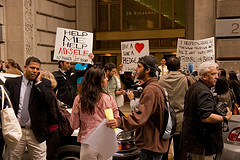Under Troubled Asset Relief Program (TARP) of the U.S. Treasury, Citigroup and Goldman Sachs received $25 billion each and Bank of America received $10 billion in federal bailout funds. It has been argued that much of the the global economic meltdown was brought on by the country’s largest financial institutions. In response to the recent bailouts, Harrington Investments, Inc., a socially responsible investment (SRI) advisory firm, announced that they have submitted binding bylaw amendments at Citigroup, Bank of America and Goldman Sachs that would create Board Committees on U.S. Economic Security.
[social_buttons]
The bylaw states that the board should consider the impact of bank policies on U.S. economic security as part of their fiduciary duty:
U.S. Economic Security’ impacted by bank policy may include, among other things 1) the long term health of the economy of the U.S., 2) the economic well-being of U.S. citizens, as reflected in indicators such as levels of employment, wages, consumer installment debt and home ownership, 3) levels of domestic and foreign control, and holdings of securities and debt, of companies incorporated or headquartered in the U.S. and 4) the extent to which our company holds securities of foreign companies or has employees or representatives holding positions on the boards of directors of foreign companies.
The shareholder statement argues that taxpayer efforts to stabilize the U.S. economic system were precipitated by “years of irresponsible lending and business practices. Unregulated trading in speculative derivatives and a general lack of management and board oversight at major U.S. financial institutions has brought the global economy to the brink of disaster.”
The U.S. Treasury has purchased preferred stock in these companies but has waved all voting rights. This leaves U.S. taxpayers with limited tools to intervene, should these banks act irresponsibly or against the interest of their shareholders, which includes American Taxpayers.
“Following recent government interventions, there can be no doubt that the financial integrity of these companies is interdependent with a strong and secure U.S. economy. The time has come for shareholders and members of the public to demand that bank managers and boards work to ensure that recent events are not repeated and that the investment by the US taxpayers brings reciprocal benefit to U.S. economic security in general,” stated John Harrington, CEO of Harrington Investments, Inc.
What do you think about this approach? Let us know your thoughts.
Photo Credit: By Photo Credit: Lindsay Beyerstein via Flickr’s Media Commons






